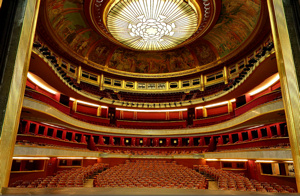Jephtha
April 2025 | ||||||
|---|---|---|---|---|---|---|
Mo | Tu | We | Th | Fr | Sa | Su |
The story of the composition of Jephtha by Handel has all the makings of a drama in its own right. This is the last oratorio written by the ageing musician whose sight was fast failing, but perhaps the most moving. The work bears the marks of the illness that afflicted him while he was composing it, but which did not undermine his faith. “Whatever is, is right” sings the chorus. Handel’s conviction and energy appear unshakeable. The original score bears the marks of the musician’s pain: “Arrived here on Wednesday 13 February. Couldn’t continue because of my left eye.” A little later, on 23 February, he writes: “feeling slightly better, Have resumed work”. These words are reflected in his music. The huge star Joyce DiDonato will in turn embody this painful journey suffused with the vocal sumptuosity which is the hallmark of the musician’s entire œuvre.
Synopsis
Act 1
The Israelites have been under the rule of the neighbouring Ammonites for eighteen years and have adopted many of their ways and worship of their gods. They face the loss of their country and their religious identity unless they rebel, as Zebul tells them (Accompanied recitative: It must be so). Zebul advises them to recall his half-brother Jephtha from exile so he can lead them to freedom and to repent of their worship of the Ammonites' idols (Air: Pour forth no more unheeded pray'rs). The Israelites vow to stop their sacrifices to the Ammonite gods Moloch (a god associated with child sacrifice) and Chemosh and thenceforth to worship Jehovah only (Chorus: No more to Ammon's god and king). Jephtha, trusting in his own virtue, agrees to lead the Israelites in battle against their enemies on condition that if he is victorious he will be their leader in peacetime afterwards (Air: Virtue my soul shall still embrace). His wife Storgé supports his mission to win freedom for their country but will miss him sorely while he is away (Air: In gentle murmurs will I mourn). Iphis, only child of Jephtha and Storgé, is asked by her sweetheart Hamor to marry him soon (Air: Dull delay, in piercing anguish) but she tells him to prove himself worthy of her by fighting valiantly under her father's command first (Air: Take the heart you fondly gave). He agrees to this and the pair look forward to a happy future together after their country has achieved its freedom (Duet: These labours past, how happy we!) Jephtha, alone, vows to the Almighty that if he is allowed to win victory over Israel's enemies, he will sacrifice to God the first living thing he sees upon his return after the battle (Accompanied recitative: What mean these doubtful fancies of the brain?) The Israelites implore divine assistance (Chorus:O God, behold our sore distress). Jephtha's wife Storgé is unaware of her husband's rash vow but she is experiencing presentiments of tragedy (Air: Scenes of horror, scenes of woe). She explains to her daughter that she has had dreams of danger to Iphis, but Iphis attempts to dismiss her mother's nightmares as meaningless (Air: The smiling dawn of happy days). The Israelites have sent an embassy to the king of the Ammonites offering peace terms, but it has been rejected. Therefore, Jephtha orders the Israelites to prepare for war and they express their confidence that God will aid them (Chorus: When His loud voice in thunder spoke).
Act 2
Hamor brings Iphis the welcome news that her father has utterly vanquished the Ammonites in battle. The Israelites celebrate their resounding victory, which they ascribe to angelic assistance (Chorus: Cherub and seraphim). Having proved himself in the battle, Hamor hopes that Iphis will now agree to marry him (Air: Up the dreadful steep ascending). Iphis prepares to go out to congratulate her father with other young girls, greeting him with song and dance (Air:Tune the soft melodious lute). Zebul is jubilant that Jephtha has won liberty for his people (Air: Freedom now once more possessing) but Jephtha insists that the glory is the Lord's (Air: His mighty arm, with sudden blow). The Israelites offer thanks to God (Chorus: In glory high, in might serene). Iphis leads a procession of young girls singing and dancing to welcome her father's return (Air: Welcome as the cheerful light and Chorus of Virgins: Welcome thou) but Jephtha is horrified that his daughter is the first living thing he has seen on his return and orders her to leave him. His vow requires him to sacrifice his only child, but he would prefer to die himself (Air: Open thy marble jaws, O tomb). He explains to his wife, brother and Hamor that having made this rash vow he must now kill his daughter. His wife vehemently rejects this horrific prospect (Accompanied recitative: First perish thou and air: Let other creatures die) and Hamor pleads to be allowed to die in his sweetheart's place (Air: On me let blind mistaken zeal). All three implore Jephtha not to carry out his cruel vow but he insists that he has no choice (Quartet: Oh, spare your daughter). Iphis returns, having heard of her father's vow (Accompanied recitative: Such news flies swift) and accepts that she must now be killed by the hand of her father (Air:Happy they). Jephtha is deeply anguished (Accompanied recitative: Deeper, and deeper still) but still feels he must fulfill his vow. The Israelites comment on the unknowable ways of God (Chorus: How dark, O Lord, are Thy decrees).
Act 3
In intense distress, Jephtha prepares to take his beloved daughter's life (Accompanied recitative: Hide thou thy hated beams) and prays that she may be received into heaven (Air: Waft her, angels, through the skies). Iphis is resigned to her fate (Air: Farewell, ye limpid springs and floods) and the assembled priests preach submission to the divine will (Chorus of priests: Doubtful fear and rev'rent awe). As Jephtha lifts the sacrificial knife however, heavenly music is heard and an angel appears, declaring that human sacrifice is not pleasing to God. Iphis must be dedicated to God's service and stay a virgin through life, but she will live (Air: Happy, Iphis shalt thou live). The priests praise God's mercy (Chorus: Theme sublime of endless praise). The rest of Jephtha's family come in and Zebul proclaims that Iphis' faith and courage will forever be remembered (Air: Laud her, all ye virgin train). Storgé is relieved and happy that her daughter will not be put to death (Air: Sweet as sight to the blind) and Hamor is also glad Iphis will be safe though he mourns the fact that she can never be his wife (Air: 'Tis Heav'n's all-ruling pow'r). Iphis hopes he will find another love as she dedicates herself to serve God alone throughout her life (Air: All that is in Hamor mine) and promises to hold him in esteem as he accepts her decision (Duet: Freely I to Heav'n resign). All express their joy (Quintet: Joys triumphant crown thy days).
Program and cast
Sung in English, subtitled in French and English
Approximate running time 2h40
Michael Spyres | Jephtha
Joyce DiDonato | Storgé
Mélissa Petit | Iphis
Jasmin White | Hamor
Francesco Corti | direction
il Pomo d’Oro
Théâtre des Champs-Élysées

The Théâtre des Champs- Elysées is undoubtedly one of the finest venues in Paris . Built in 1913 , it has the distinction of having been designed by a group of artists architects Henry Van de Velde and Auguste Perret , the painter and sculptor Antoine Bourdelle , the painter Maurice Denis , and the crystal- René Lalique to do mention the main ones . He was the first Parisian theater to be built entirely of reinforced concrete.
Restoration of the Great Hall devoted to operatic performances , symphony concerts and dance was decided in 1985. Two years later , on 23 September 1987, the theater reopened its doors , completely renovated. Fifteen years after this important work it was decided to undertake a new renovation campaign , but to prevent the complete closure of the theater for an entire season , work is now carried by step during the summer . Then it is to replace aging equipment , to remedy wear certain parts of the theater and improve spectator comfort and artists during their visit . Thus in recent years, including the work involved the renovation of marble facade, replacing the carpet in the room with wooden floors , installation of a new fully decorated wooden concert to a significant improvement of acoustics, the orchestra pit and stage below .
The Théâtre des Champs- Elysées is now a modern working tool receiving each year nearly 300,000 spectators and a few thousands of artists and collaborators.
The Théâtre des Champs- Elysées , the jewel of French architecture of the twentieth century, was in 1953 one of the first buildings of contemporary architectural heritage to be classified as historic monuments . Since 1970 the Caisse des Dépôts owns the entire building 15 avenue Montaigne and principal patron of the theater.
For over a century, Théâtre des Champs-Elysées has been the place where the most celebrated artists have come to make their names in Paris. The world’s finest orchestras and world-class soloists have always been a fixture at the Theatre. Théâtre des Champs-Elysées presents more than 200 concerts each year and is renowned for its outstanding performances of all genres, from classical music concerts and staged opera to contemporary dance and jazz.
How to reach us:
Subway: Alma-Marceau (line 9), Franklin D.Roosevelt (line 1), Pont de l’Alma (RER line C)
Bus: n° 42, 63, 72, 80, 92
Taxi station: Place de l’Alma, corner of avenue George V
Car park: Alma George V. The entrance is in front of n° 19, avenue George V
Fixed rate depending on the length of the performance. Payment upon entering.

 EN
EN DE
DE IT
IT FR
FR ES
ES RU
RU JP
JP RO
RO
 Seating plan
Seating plan 